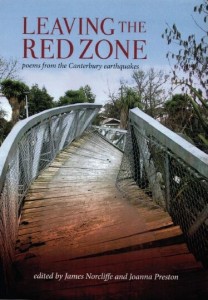Tuesday & Poetry: Lines from “Leaving the Red Zone”
 Last week, I reported on the extraordinarily successful launch of Leaving the Red Zone, the poetry anthology (edited by James Norcliffe and Joanna Preston, and published by Clerestory Press) that commemorates the fifth anniversary of the February 22, 2011, earthquake that devastated my home city of Christchurch.
Last week, I reported on the extraordinarily successful launch of Leaving the Red Zone, the poetry anthology (edited by James Norcliffe and Joanna Preston, and published by Clerestory Press) that commemorates the fifth anniversary of the February 22, 2011, earthquake that devastated my home city of Christchurch.
The week since then has been frenetically busy so I haven’t had time to seek permission or obtain the text of full poems—or even, in fact, to take a proper look at the book. Even dipping into it, though, I see it is full of fabulous poems and so I am going to share some of the wonderful lines and stanzas with you today. I hope they will inspire you to read the book. I don’t think you’ll regret doing so.
“It’s half-dark. The drunken lurching
breaks and cracks and snatches all
familiar ground — tears the possibilities
of tomorrow into shreds.”
~ Helen Bascand, Out There
.
“An earthquake grew me up
I unhappened
was just a shoe size away from falling
into fissures, being pulverized by wall fall”
~ Robynanne Milford, My Name Is Aurelia
.
“Strange days when the crockery flies
Strange days when the red bricks dance
to an Orphic tune on xylophones like
a poltergeist has got into them.
Then the sirens begin to scream.”
~ Andrew Paul Wood, The Big One
.
“Quiver and stamp.
Quiver and stamp on
a blue day and you small,
straddled across the back
of a big beast. And
that is how the earth is.”
~Fiona Farrell, The Horse








This is probably very ignorant, but what does the phrase ‘red zone’ mean in the title? Was that the worst hit area?
Not ignorant at all, Penelope—or only understandably so, not being a Christchurch person. The “red zone”, or “residential red zone”, comprises those parts of Christchurch where the land was considered so badly damaged by the earthquakes that it was no longer tenable for people to live there. So, basically, the government bought the landowners out, so they had to move elsewhere, either in Christchurch or NZ. It wasn’t quite compulsory acquisition, but was very close to it in some cases.
Poignant, Helen. Means more now that I’ve been to Christchurch myself. Been thinking of you.
Thank you, Marion.